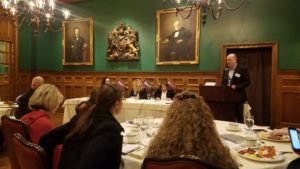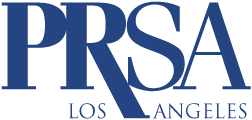 L.A. has more startups than anywhere else, and all that entrepreneurial activity should create tremendous demand for independent PR practitioners.
L.A. has more startups than anywhere else, and all that entrepreneurial activity should create tremendous demand for independent PR practitioners.
This expanding pool of opportunity was the subject of PRSA-LA’s second annual Independent Practitioners Alliance (IPA) workshop at Lawry’s in Beverly Hills. The workshop explored new business in a different light: not just winning new clients but working smarter and finding new business in unexpected places.
Opening the workshop was IPA Section Chair John Novaria, who pointed out the parallels between startups and independent PR professionals.
“Our overhead is less than big agencies, we have a high degree of accountability, we’re focused and efficient and like startups we’ve invested a lot in our business,” he said.
Novaria reminded attendees that startups represent hidden opportunities for solo practitioners. He then introduced the expert panelists who shared their strategies for identifying and maximizing opportunities and using a systematic approach to generating new business.
Panel 1: Building Your New Business Pipeline
- Elle Hamilton, Senior Vice President of Business Development at Syneos Health Communications, suggested tailoring one’s social media to the clients one aspires to. “Post and comment on issues that you’re passionate about, and react to news in the moment,” she said. “You don’t have to write continually or have a big platform.”
- Oralia Michel, Owner of OMAGEN PR, reminded the audience of something that’s often forgotten: “You’re all in sales!” She told how she won a client by buying a ticket to a gala where her intended client was being honored. She then met the client and asked for an opportunity.
- Kathy Vincent, Owner of KV Consulting & Management, said she’s intrigued by people who prefer to remain in the shadows and let others have the limelight. She said, “I don’t promote myself. I promote my clients.”
Panel 2: Working with Startups
- Emily Barnes, Owner of Symphony PR, said of working with startups, “Entrepreneurs are innovators, builders and disruptors. They’re not necessarily communications and PR pros. That’s where we add value.” Barnes, who worked with YouTube when it was in its infancy, said she prefers working for serial entrepreneurs because they have a track record of success and have clear goals.
- Corey Carleton, Former Marketing & Communications Director at Larta Institute, advised that PR professionals should set expectations about their revenue since many startups they work with are still at the pre-revenue stage.
Panel 3: Powering Indie Partnerships
- Jean Gonsoulin, President of The Gonsoulin Group, said networking and prospecting are important because “you need lines in the water.” Gonsoulin explained her “best teams” approach, where she taps the right people for the assignment from her network and has different people for different clients.
- Denis Wolcott, President of The Wolcott Company, revealed the chaotic nature of being an independent with multiple alliances. “My clients and partners prefer to ‘white label’ me, which means I need to maintain lots of email accounts,” he said.
Participants praised the event, citing it for “great practical advice” and “good info on networking and finding firms looking to hire.” One appreciated hearing “how to work with startups that may not be ready for media relations.” Participants also appreciated the “tips on teaming up and productivity issues” and “tangible advice on how to approach new business leads.” Others appreciated the time set aside for networking and getting to meet panelists face-to-face.
In just its second year, the IPA workshop made a big splash. One participant said a colleague from a large agency told her she didn’t want to miss the next event, “as skills and topics you covered are also applicable to a big agency setting too.”
Thanks to panel moderators David Garcia, Stacy Schwartz and Dan Minkoff and the rest of the IPA committee – Jeryldine Saville, Jessica Payne and Stephen Chavez – for their efforts in making the workshop a huge success.








